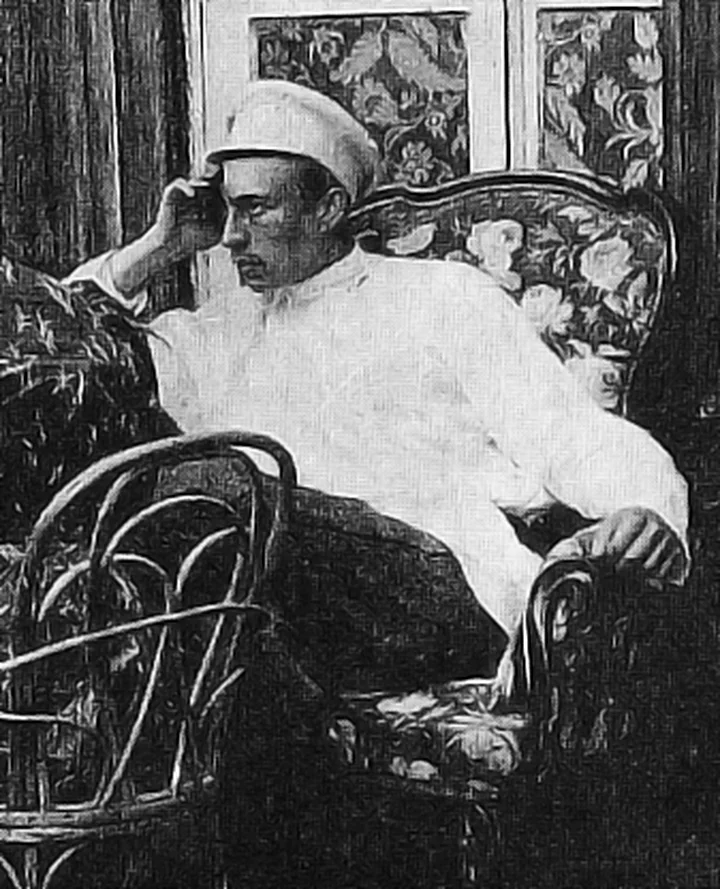What follows is best appreciated with this music in the background:
1957, in the thick of pubescent hormones, Elvis, Bill Haley, Don and Phil, Sputnik. I’m in the living room of Mr. and Mrs. Hay and (heart, be still) their daughter Jenny. LPs, long-playing records, were still a new fad — they came out in 1948, but the old 78’s hung on for years after — and Mr. Hay was the proud owner of a huge, new, record player, with a smattering of LPs to go with it. I’m pretty sure he wouldn’t have approved of any of my idols at the time (not even Fats Domino, can you believe?), but the Romantic composers — Brahms, Robert Schubert, Tchaik, Grieg, they was something else. Not forgetting (how could one?) Rachmaninoff.
Sergei Rachmaninoff, 1897 (Glinka Museum of Moscow, unknown photographer, public domain)
Young Sergei — he was 24–practically gave up composing after critics universally panned his first symphony. (One suggested it would be admired by the inmates of a music conservatory in Hell.) (The conductor was probably drunk.) Four years of deep depression followed, but in an heroic effort supplanted with daily hypnotherapy, he fought his way out of it and went on to compose — and play, brilliantly — his second piano concerto. More success followed, both musically and personally — he married his beloved first cousin Natalia — and had the wit to move his family out of Russia before political unrest completely upstaged the cultural scene in Moscow. His second symphony followed, in 1906.
Rachmaninoff proofing his Piano Concerto No. 3, 1910. (Unknown photographer, public domain)
It was Rachmaninoff’s Second Symphony that the four of us were now listening to that evening in the Hay’s living room. Taking my cue, I sat there quietly, through the entire nearly one-hour, three sides of LPs, performance. Heck, I’d have sat through the entire five-hour Götterdämmerung if I could just spend ten minutes after alone with Jenny, trying to get to first base. (Good luck with that!) Finally it was over. I had no idea what I was to do or say. Finally Mr. Hay spoke in his thick Aberdeen brogue. “Doesn’t that music reach down to the very bowels of your soul?” he asked, looking at me expectantly. I wasn’t quite sure which my bowels were, and was even less certain of my soul, but this was not a time to argue with the father of my beloved, my Beatrice.
“Gosh, yes, it certainly does, Mr. Hay. All the way!” “And what do you think the composer was saying to us in the adagio?” (Adagio? That means “slow,” right?) “Um, the slowness of it was sublime, wasn’t it?” I replied, “Quite sublime.” ( I just learned “sublime” in English as school.) “It’s good to meet a fellow music lover,” he said, casting a despairing glance at Jenny, who was clearly bored out her gourd, while Mrs. Hay showed no emotion at all.
“Well then, time for you to be on your way then.” And I was. Perhaps the barest smidgen of a brush of a kiss on Jenny’s chaste cheek, and I was off into the dark, my heart throbbing, feet barely touching the ground between her house and mine.
Opening of the third movement in A Major. (Wikipedia)
And that’s why, anytime I hear the third movement of Rach’s Second Symphony, I think of Jenny’s sweet Scottish face — unchanged, 65 years on — and, were you to ask, I would sum the music up in a single word: sublime.



CLICK TO MANAGE